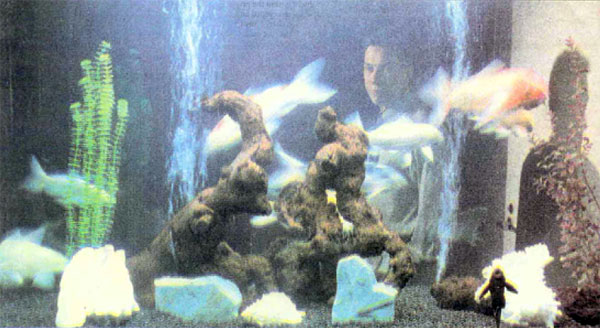By Doug Margeson, Journal American
Originally published Nov 25, 1992

Journal America Photo – Steve Clayton is seen through one of the aquariums in his home. His company, Clayton Aquariums, installs tanks in businesses.
Eastsider Steve Clayton helps businesses go fish
Steve Clayton wants to put some life into your workplace.
That life is an aquarium, a big glass box full of a lot of little fishes, fishes with color, shape and personality.
“Humans aren’t meant to live in sterile environments. It’s contrary to our nature. “Clayton said. “So, putting an aquarium in your workplace makes it a livelier, more natural place to work.”
Clayton has been putting that philosophy into effect for more than 35 years with Clayton Aquariums Inc. The Bellevue-based company is, as far as Clayton knows, the largest aquarium service company in the country, with more than 700 clients in a thousand-square mile area bordered by Olympia, Mount Vernon, Bremerton and Issaquah. The company also has customers in Oregon, California, Alaska, Utah and Arizona.
And all came to Clayton. The company does not make cold sales.
Why such success?
Because, as Clayton already said, our species is not meant to work in windowless, lifeless boxes. Not that many companies haven’t tried to that over the years. You know: Quit staring out the window and get back to work. Ultimately, that approach will come up short, because it is the nature of humans to occasionally look out the window, Clayton said. And if humans don’t have a window, we’ll do something else, although we probably won’t be happy with it.
Notice how the conversation has taken on the tones of a wildlife biologist describing some critter’s behavior? Not surprising. Clayton and his staff spend the day surrounded by critters; tank after tank of saltwater and freshwater fish. All of those fish have things on their minds that have very little to do with profit margins and flow charts. And they show it.
“Yeah, I feel a lot of affection for them,” said Peter Korch, operations manger for the company. “Some will say fish aren’t capable of intelligence, but I’m not so sure. They certainly have personalities of their own.”
Korch pointed to a 100-gallon tropical tank that held fish waiting to be transferred to one of Clayton’s commercial aquariums. Most of the fish were swimming around in various ways. One was hiding in a shell. Every now and then, he’d stick his nose out and look around, but he apparently didn’t like what he saw and would scoot back in.
“Just arrived from overseas, still getting his bearings,” Korch said. “In a few days, he’ll be used to things and swimming around like everyone else.”
Everyone else is the 30 or so species of saltwater fish the company has swimming around its office at any one time. Another dozen or so freshwater varieties also grace its tanks. Saltwaters are more popular, however, because they are bigger and offer the most striking colors.
Tropical fish are the most common because it is easier to heat an aquarium than to cool it, which you have to do if you want a North Pacific aquarium, Korch said.

